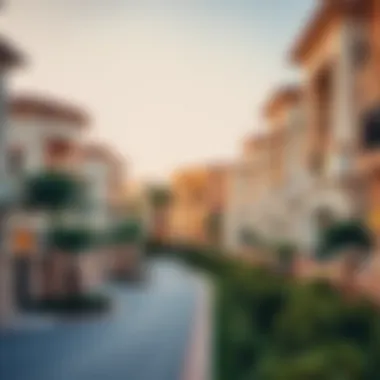Navigating Life in the UAE: A Comprehensive Guide


Intro
Living in the United Arab Emirates (UAE), particularly in Dubai, can be both a thrilling adventure and a deep dive into a different world. As a melting pot of cultures, the UAE offers an array of experiences, from vibrant markets bustling with life to modern architectural wonders that have redefined skylines. This guide aims to illuminate the path for expatriates, investors, and anyone curious about life in this dynamic region.
Transitioning to life in the UAE comes with its own set of challenges and opportunities. Understanding market trends is vital for anyone looking to make a solid investment or simply find the right place to call home. The real estate landscape evolves rapidly here, influenced by both local and global economic shifts. So buckle up; this journey through the intricacies of living in the UAE will equip you with knowledge and insights that are essential for navigating your new life with confidence.
Next, we delve into the current market trends, where understanding property prices and future predictions can directly impact your decisions. If you're an investor or a potential renter, getting a grip on these trends will serve you well.
Understanding the UAE Context
Understanding the context of the United Arab Emirates is crucial for anyone considering a move to this dynamic region. The UAE, especially Dubai, has transformed over the past few decades from a group of small fishing villages into a global hub for commerce, tourism, and cultural exchange. Recognizing the historical, cultural, and political nuances of the UAE can provide invaluable insight for expatriates and investors alike.
Diving deep into the UAE's past helps paint a picture of how the present landscape was shaped. Beyond the glimmering skyscrapers and luxurious shopping malls lies a rich tapestry woven from diverse cultural influences. Furthermore, understanding the political structure aids in navigating life in the UAE smoothly, as governance affects everything from business operations to daily life.
Historical Overview
The history of the UAE is a fascinating tale, starting with its formation as the Trucial States in the 19th century. This term refers to a series of agreements among a group of sheikhdoms, which eventually laid the groundwork for the modern UAE. By the 1970s, following British withdrawal, the UAE unified to form a federation of seven emirates: Abu Dhabi, Dubai, Sharjah, Ajman, Umm Al-Quwain, Fujairah, and Ras Al Khaimah. This major transition spelled the beginning of a new era, replacing an economy based on pearl diving and fishing with one centered around petroleum exploration.
The rapid development and modernization that followed were astonishing. Oil reserves were discovered in the 1950s and, like a genie from a lamp, they propelled the nation into unimagined wealth and development. Infrastructure came flying forth; schools, hospitals, and roads materialized almost overnight, and the UAE began to attract a diverse international workforce.
Interestingly, the UAE's commitment to cultural heritage preservation runs parallel to its rapid modernization. Even with the fast-paced lifestyle, traditional customs are still deeply respected and are visible in cultural festivals and architecture across the emirates.
Cultural Landscape
The cultural landscape of the UAE is a blend of old and new—where ancient traditions coexist with modern innovations. With expatriates making up a significant portion of the population, the country is a melting pot of cultures, languages, and religions.
Emirati culture is deeply rooted in Islam, which influences etiquette and social interactions. Visitors and residents alike are reminded to respect local traditions, such as the holy month of Ramadan, when fasting is observed. Moreover, a simple handshake may be frowned upon between genders, reflecting the country’s conservative values.
Additionally, cultural festivals such as Eid and the Dubai Shopping Festival highlight the vibrancy of local life and offer opportunities for celebration and community engagement. Local markets offer an authentic taste of Emirati cuisine, blending spices and flavors from different parts of the world.
For expatriates, understanding these cultural nuances is pivotal for building connections and integrating into society, making daily life smoother and more enjoyable.
Political Structure
The political framework of the UAE is characterized by a unique mix of traditional governance and modern political practices. Each emirate is governed by its own monarch, while a President and Council of Ministers oversee the federal government. Abu Dhabi holds a special status as the capital and is home to the country’s oil wealth, while Dubai, often seen as the face of modernity, fosters economic growth.
The absence of political parties often catches newcomers off guard. Instead, the system operates on tribal and familial lines, where loyalty to the ruling families and the emirates plays a crucial role in governance. Expats will find that understanding this structure can pave the way for smoother interactions in both personal and professional realms.
Moreover, local laws and regulations vary significantly across the emirates, so staying informed about these can prevent potential legal issues, especially in a multicultural environment like the UAE.
In summary, understanding the historical, cultural, and political contexts of the UAE is indispensable for anyone navigating life in this vibrant, ever-evolving landscape. Those who take the time to understand the complexities of this region will not only adapt better but also uncover opportunities that lie beneath the surface.
"A nation’s greatness is measured by how it treats its weakest members" - Mahatma Gandhi
For further insights, consider visiting Wikipedia or Britannica.
Housing Options in the UAE
Housing in the UAE is a topic of great importance for expatriates and potential residents. Understanding the various housing options can greatly influence one's living experience and overall satisfaction in this vibrant country. The UAE offers a diverse range of properties, catering to different tastes, preferences, and budgets. This section will explore various types of properties, analyze the rental market, and weigh the options between buying and renting.
Types of Properties


Luxury Apartments
Luxury apartments in the UAE, particularly in cities like Dubai and Abu Dhabi, stand out for their high-end features and prime locations. These properties typically come with state-of-the-art amenities, such as swimming pools, gyms, and more. Many luxury apartments are in prestigious skyscrapers offering stunning views of the city skyline or waterfronts.
One key characteristic of these apartments is their exclusive lifestyle — residents often enjoy concierge services and access to high-end retail outlets. This kind of living is often appealing to professionals and expatriates who prioritize comfortable living and connectivity. However, the cost can be quite steep, making it essential for potential renters or buyers to evaluate their financial situations before committing.
A unique feature of luxury apartments is their maintenance services, usually included in the rental or purchase agreements. While this provides convenience, it also means that residents have less control over certain aspects of their living environment, which can be a drawback for some individuals.
Villas
Villas are another popular housing option in the UAE, especially among families looking for spacious living. Typically larger than apartments, villas often come with private gardens, pools, and garages. This option provides a sense of privacy and community living while still being close to urban amenities.
The key characteristic of villas is their expansive living space, which allows families to enjoy a comfortable lifestyle with ample room for children to play. They can be found in various communities that are gated, offering additional safety and a close-knit community feel.
One unique feature of villas is their customizability; many allow residents the freedom to modify their homes. However, this may come at an additional cost and involves more personal responsibility for upkeep compared to luxury apartments.
Studio Apartments
For single professionals and young couples, studio apartments present an attractive option in the UAE. These compact living spaces can be found across the country and typically include a combined living and bedroom area alongside a small kitchenette.
The key appeal of studio apartments lies in their affordability compared to larger properties; they offer a great entry point for newcomers. The compactness of these apartments often means lower utility bills and maintenance costs.
A significant advantage is their location, as many studios are situated in hotspots close to work and entertainment, making them ideal for those who prioritize mobility and convenience. However, the limited space can be a disadvantage for those valuing privacy or planning to host guests.
Rental Market Analysis
Analyzing the rental market in the UAE reveals several trends. Rental prices can fluctuate based on location, property type, and rental duration. Properties closer to the city center, such as Downtown Dubai, often command higher prices, while suburbs can provide better value.
Ultimately, the demand for rentals has remained strong, largely driven by the influx of expatriates and professionals. This, coupled with a competitive market, results in an engaging rental landscape that is worth exploring for anyone considering a move to the UAE.
Buying vs. Renting
When it comes to living in the UAE, deciding to buy or rent is a critical consideration. Buying a property can be a long-term investment that yields various financial gains, especially in growing areas. However, potential buyers face restrictions based on certain laws regarding foreign ownership and financing conditions.
On the other hand, renting offers greater flexibility, allowing residents to adapt their living situations without a long-term commitment. For expatriates unsure about their long-term plans in the UAE, renting may seem a more practical option. How one chooses between the two largely depends on individual circumstances, financial status, and how long they intend to stay in the country.
Ultimately, weighing these options requires careful thought and planning, taking into account personal needs and lifestyle preferences.
Navigating the Real Estate Market
Navigating the real estate market in the UAE is akin to traversing a bustling bazaar—one wrong turn, and you could miss out on a gem or stumble into a trap. For investors, expatriates, and real estate agents, understanding this market is crucial not only for making informed decisions but also for maximizing opportunities. The UAE’s real estate landscape has been evolving rapidly, influenced by economic shifts, new regulations, and social changes. An informed approach helps you dissect these layers, allowing for strategic moves whether you’re renting, buying, or selling.
Understanding Market Trends
Keeping a finger on the pulse of market trends is vital. The UAE, particularly Dubai, witnesses fluctuations influenced by a cocktail of factors ranging from global economic conditions to local demand and government policies. Recent years have showcased a trend toward sustainability and smart living, reflecting a broader global focus.
For instance, the rise in requests for luxury properties with eco-friendly amenities is evident, as many prospective buyers look for homes that align with their values. Recent data from the Dubai Land Department indicates that properties near major business districts such as DIFC or those that offer easy access to public transport tend to see higher demand.
Here’s a snapshot of essential trends to keep in mind:
- Luxury Market Boom: Assets in exclusive areas are always sought after, driven by tourism and international buyers.
- Affordable Housing: There's a growing movement towards more affordable housing projects aimed at middle-income families.
- Market Recovery Post-COVID: There’s an uplift in transactions; people are keen to invest again after the previous downturn.


"Understanding market trends isn’t just about charts—it’s about reading the room, knowing when to strike while the iron is hot."
Investment Opportunities
The UAE remains a lucrative destination for real estate investment. It offers a rich tapestry of opportunities that entice local and international investors alike. Key areas of interest include:
- Off-plan Properties: Investing in properties before construction can yield significant returns. An example is the recent developments in Dubai’s schedule for Expo 2020, where many investors have found themselves in advantageous positions.
- Short-term Rentals: With a booming tourism sector, short-term rentals via platforms like Airbnb have become profitable ventures. Properties in downtown Dubai or near holiday attractions often bring in high rental yields.
- Commercial Real Estate: With the rise of startups and the push for entrepreneurs, the commercial property sector offers numerous opportunities, be it office spaces, co-working arrangements, or retail establishments.
Legal Considerations
Understanding the legal landscape is paramount when engaging in the UAE's real estate market. For expatriates and foreign investors, navigating legal waters can be challenging due to regulations that seemingly change overnight.
Here are a few key legal aspects to consider:
- Property Ownership Laws: Foreign investors are generally permitted to buy property only in designated areas—freehold zones. Familiarizing oneself with specific laws prior is crucial.
- Contractual Obligations: Ensure any involved contracts are scrutinized carefully. Real estate transactions often have a labyrinth of terms that, if misunderstood, could lead to disputes.
- Regulatory Framework: Be aware of the governing bodies like the Dubai Land Department and Real Estate Regulatory Agency (RERA), as they establish and enforce rules governing property transactions.
Negotiating these legal waters can be daunting, but they are necessary for protecting your investment and ensuring a smooth transition into the UAE’s real estate market.
Adapting to Local Culture
As you embark on your journey in the UAE, understanding and adapting to local culture is paramount. The UAE is a melting pot of traditions and modernity, where the past and future coexist seamlessly. Grasping the nuances of local customs can make settling in a smoother endeavor. Not only does this foster harmonious relationships with locals, but it also enhances one's overall living experience. The landscape of the UAE isn't just defined by skyscrapers and luxury but also by the deeply rooted customs that shape everyday life.
Social Etiquette
When it comes to social interactions in the UAE, a blend of traditional respect and modern casualness shapes the etiquette. Greetings matter a lot; a simple handshake can go a long way, especially between men. However, men should refrain from initiating any physical contact with women unless given the option first. The phrase "As-salamu alaykum" is often the norm, and responding with "Wa alaykumu as-salam" is appreciated.
It's also important to understand the significance of hospitality. Locals take pride in treating guests with warmth. If you’re invited to someone’s home, bringing a small gift is considered courteous. However, during Ramadan, respect for those fasting is crucial; eating or drinking in public during daylight hours could be viewed as inconsiderate.
Local Customs and Traditions
Customs and traditions play a vital role in everyday life in the UAE. For instance, Friday is the holy day for Muslims, prompting many businesses to close for the day, shifting the workweek to Monday through Friday. Festivals like Eid al-Fitr and Eid al-Adha are celebrated with great enthusiasm, emphasizing family bonds, charity, and community spirit. Participating or acknowledging these festivals can help you integrate more smoothly into the society.
Additionally, dressing modestly is essential, especially in public spaces. For men, the dishdasha is common, and women often wear the abaya. Even in more liberal settings like Dubai, adopting a respectful approach toward attire shows understanding of local cultural sensitivities.
Language and Communication
While Arabic is the official language of the UAE, English is widely spoken, especially in urban settings. Familiarizing yourself with a few basic Arabic phrases can be beneficial and pleasant for locals. Simple greetings, such as "Marhaban" (Hello) and "Shukran" (Thank you), can ease communication and illustrate your willingness to engage with the culture.
Communication styles may differ. The Emirati way tends to be direct yet cordial. Tact and subtlety are appreciated in more personal discussions. Moreover, keep in mind that discussions about politics or religion can be sensitive. Opt for neutral topics if you're unsure, as finding common ground is often the best strategy.
"Understanding local culture is not just a matter of respect; it's a key ingredient for building lasting relationships."
Engaging with Emirati culture is more than just a task—it’s a pathway to richer experiences. As you embrace the nuances of local etiquette, customs, and communication, you pave your way to a harmonious and fulfilling life in the UAE. Building these bridges can only serve to enhance your comfort in this vibrant and evolving society.
Employment and Work Culture
Understanding employment and work culture in the UAE is essential for anyone considering this vibrant region for their next career move. It reflects not just the job opportunities available, but also the dynamic interplay of diverse cultures within the workforce. As an expatriate, exploring this domain offers clear insights into how business operates and how to effectively navigate the landscape.
Job Market Overview
The UAE boasts a robust job market, driven primarily by its booming economy. With Dubai and Abu Dhabi leading the way, sectors such as technology, finance, healthcare, and tourism offer plentiful opportunities. With many multinational companies establishing their headquarters in the UAE, there's a melting pot of job prospects for skilled professionals.


The average salary can vary significantly depending on the industry and position. For instance, IT professionals might easily pocket a higher wage compared to those in logistics. Additionally, the high demand for talent in specialized fields often creates a competitive environment where qualified candidates can negotiate favorable salaries and benefits.
Moreover, expatriates play a key role in this labor market. According to various reports, approximately 80% of the UAE's workforce is made up of foreigners. This makes networking vital for newcomers. Engaging with local professionals and other expatriates can substantially enhance job search success. It's not just about applying for jobs; it's about making connections.
💡 Tip: Join industry-specific groups on platforms like LinkedIn to stay informed and meet potential employers.
Work Visa Regulations
Navigating the work visa landscape in the UAE is a critical aspect of employment. The country has specific visa categories depending on the job type and nationality. Most expats will need a work permit, which is typically sponsored by their employer. The employer's responsibility underscores the importance of securing a position with a reputable company first.
The process can vary, but generally involves the following steps:
- Job Offer: Obtain a formal job offer from a UAE-based employer.
- Documentation: Submit required documents, including your passport, photographs, and educational certificates.
- Medical Tests: Complete a medical check-up, which is mandatory before the visa issuance.
- Visa Application: Your employer will submit the application on your behalf.
- Entry Permit: After approval, you'll receive an entry permit allowing you to enter the UAE.
- Stay Validity: Ensure your visa is renewed in a timely manner, as penalties for overstaying can be quite severe.
By being aware of these requirements, expats can streamline their transition into the UAE labor market with less friction.
Corporate Etiquette
Corporate culture in the UAE blends diverse traditions with modern practices, and understanding this can enhance professional interactions tremendously. Punctuality is often expected, and showing up late can reflect poorly. However, it's understood that traffic can be unpredictable, especially in urban areas like Dubai.
Dress code also plays a significant role. In most corporate environments, business attire is the norm, leaning towards formal and polished styles. Men's suits and ties are a standard, while women often wear professional, conservative outfits.
Additionally, building rapport is crucial. Initial meetings may involve friendly exchanges before getting to business. Having a few phrases in Arabic can greatly enhance relationship-building; simple greetings like "Salam Alaikum" can go a long way.
Remember to respect local customs and avoid sensitive topics like politics or religion in work settings, as they may not be accepted by all.
To summarize, thoroughly understanding employment and work culture in the UAE empowers expats to integrate more smoothly and thrive in this dynamic environment. Whether it's knowing the job market landscape, mastering work visa regulations, or practicing corporate etiquette, each element plays a vital role in ensuring professional success.
For further insights, consider checking resources like Khalifa University or UAE Labour Law for comprehensive regulations and updates.
Healthcare System in the UAE
Understanding the healthcare system in the United Arab Emirates is essential for anyone looking to live in this vibrant part of the world. Health services here are differentiated by public and private systems, offering various advantages to residents. This section explores these options, delves into how to obtain health insurance, and highlights common health concerns faced by the public. The comprehensive overview serves not only to inform about existing healthcare services but also provides practical insights for expatriates navigating the system.
Public vs. Private Healthcare
In the UAE, both public and private healthcare avenues are available, each having its unique features.
- Public Healthcare: Operated mainly by the government, public healthcare is available to all residents, including expats, who contribute to health insurance. The facilities are typically wide-reaching, and services can be offered at a lower cost compared to private establishments. However, you might find waiting times increased, and the quality may vary depending on the facility.
- Private Healthcare: This sector is expansive, providing quicker access to treatments and a broader range of specialist services. Private hospitals, like Cleveland Clinic Abu Dhabi and American Hospital Dubai, boast modern technologies and highly trained physicians. However, treatment costs are usually higher, making health insurance a crucial component to consider.
plaintext Public Healthcare Pros:
- Lower cost
- Accessible for all residents
Public Healthcare Cons:
- Longer wait times
- Variable quality
Private Healthcare Pros:
- Fast access to specialists
- High-quality care
Private Healthcare Cons:
- More expensive
- Requires health insurance







